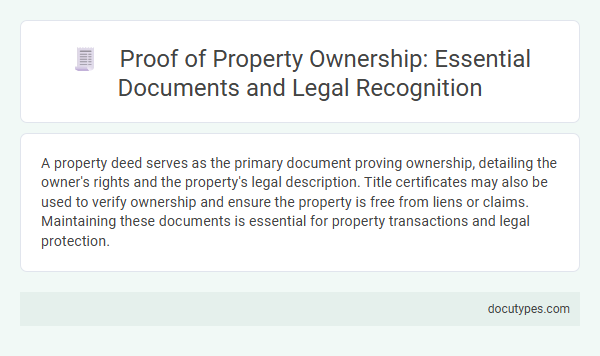A property deed serves as the primary document proving ownership, detailing the owner's rights and the property's legal description. Title certificates may also be used to verify ownership and ensure the property is free from liens or claims. Maintaining these documents is essential for property transactions and legal protection.
Understanding Proof of Property Ownership
Proof of property ownership is typically established through a legal document known as the title deed. This document contains vital details such as the owner's name, property description, and any encumbrances or liens.
Understanding proof of property ownership is essential for verifying the legitimacy of a transaction or resolving ownership disputes. Other supporting documents include property tax receipts, sale agreements, and registration certificates issued by local authorities.
Why Property Ownership Documentation Matters
Property ownership documentation serves as legal proof that an individual or entity holds the title to a specific piece of real estate. Common documents include the deed, title certificate, and property tax records, each providing verified evidence of ownership rights.
These documents are crucial in property transactions, ensuring rightful ownership and preventing disputes. They protect owners from fraud by clearly establishing legal possession. Lenders often require proof of ownership before approving mortgages or loans secured against the property.
Essential Documents for Proving Property Ownership
Proof of property ownership is established through official documents that verify an individual's legal rights to a property. These documents are crucial in real estate transactions, inheritance, and legal disputes.
- Title Deed - This is the primary document that shows the legal ownership of the property and details such as boundaries and rights.
- Purchase Agreement - A contract between buyer and seller outlining the terms of the property sale and serves as evidence of the transaction.
- Property Tax Receipts - Official records that demonstrate ongoing ownership through payment of property taxes to the local government.
Maintaining these documents securely is essential for validating ownership and resolving any future property claims.
Title Deed: The Cornerstone of Ownership
The title deed is the cornerstone of property ownership, serving as the primary legal document that proves your right to a specific property. It contains detailed information such as the owner's name, property boundaries, and any encumbrances or liens associated with the property. Holding a clear and updated title deed is essential for validating ownership and facilitating property transactions.
Sale Agreement and Its Legal Significance
What document serves as proof of property ownership? The sale agreement is a crucial document that outlines the terms and conditions agreed upon by the buyer and seller. This legally binding contract establishes the rights and obligations of both parties during the property transaction.
How does a sale agreement hold legal significance in property ownership? The sale agreement acts as evidence of the transfer of ownership rights once signed by both parties and registered according to local laws. It protects buyers and sellers by clearly specifying payment schedules, property details, and conditions, minimizing disputes in the future.
Mutation Certificate and Land Records
The primary document proving ownership of property is the Mutation Certificate, issued by local land revenue authorities after the property transfer process is complete. Land records, maintained by government departments, contain detailed information about the property's ownership history and boundaries. You should always verify these documents to ensure clear and legal ownership of your property.
Encumbrance Certificate: Ensuring Clear Title
| Document | Purpose | Importance |
|---|---|---|
| Encumbrance Certificate (EC) | Verifies property ownership status by confirming the absence of legal dues or loans on the property | Ensures clear title by proving the property is free from encumbrances, critical for secure property transactions and loan approvals |
| Sale Deed | Acts as the primary proof of ownership transfer from seller to buyer | Legal evidence of ownership rights after registration with the local authority |
| Title Deed | Reflects the history of ownership and transactions related to the property | Helps verify the chain of ownership and detect any disputes or liens |
Registration of Property: Legal Process Explained
Proof of property ownership is primarily established through the property's registration document, commonly known as the Title Deed. This legal document certifies the owner's rights and details the property's description, location, and boundaries.
Registration of property is a formal legal process ensuring the owner's claim is recognized by government authorities. It involves submitting required documents to the land registry or relevant property registration office for verification and recording.
Verifying Authenticity of Ownership Documents
Proof of property ownership is primarily established through official documents that confirm legal rights to the asset. Verifying the authenticity of these documents is crucial to ensure clear and uncontested ownership.
- Title Deed - The primary legal document that records ownership and property details, issued by a government authority.
- Property Tax Receipts - Documents that demonstrate payment history, supporting evidence of ownership and possession.
- Registry Verification - Cross-checking the ownership records at the local land registry or cadastral office to confirm document authenticity.
What Document Serves as Proof of Property Ownership? Infographic

